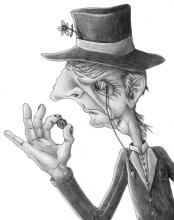penny pinching

We worry now, but we’ve been concerned about the economy for a long time. The economic recovery from the recession in America has been slower than we hoped, and people continue to suffer from the collapse of so many industries and jobs and safety nets. Much of the pain seems new for large swaths of the American population. But in reality, we’ve been worrying about money forever.
The August employment report from the Bureau of Labor Statistics shows a slight decline in the unemployment rate (down to 7.3 percent from 7.4 percent in July), according to Businessweek. But the drop is largely attributed to a reduction in the workforce of about 300,000. What’s more, the participation rate (number of people working or looking for work compared to the total working age population) fell from 63.4 percent to 63.2 percent, the lowest since 1978. The National Employment Law Project noted that much of the job growth in August was in retail and food service, industries that generally offer lower paying and part-time jobs.
Even though a growing number of economists see modest and encouraging signs in the recession recovery, the slow growth continues to cause trouble for many Americans. Businessweek writer, Matthew Philips, even questioned whether the economy might be “stuck in second gear” without hope of a more robust “third gear” to propel the recovery forward.
The economic health of the nation has long been a concern to people of faith, because we care for the poor, and poverty has been a persistent problem in rural area and urban centers alike. What’s more, we know there are people of all income levels who struggle with money and possessions, and we are concerned about this, too. We worry that people have enough to eat and that wealth not corrupt our best desires and intentions.